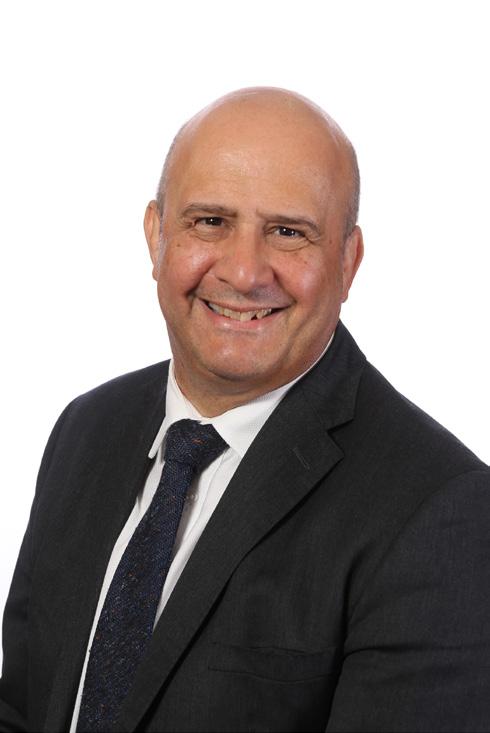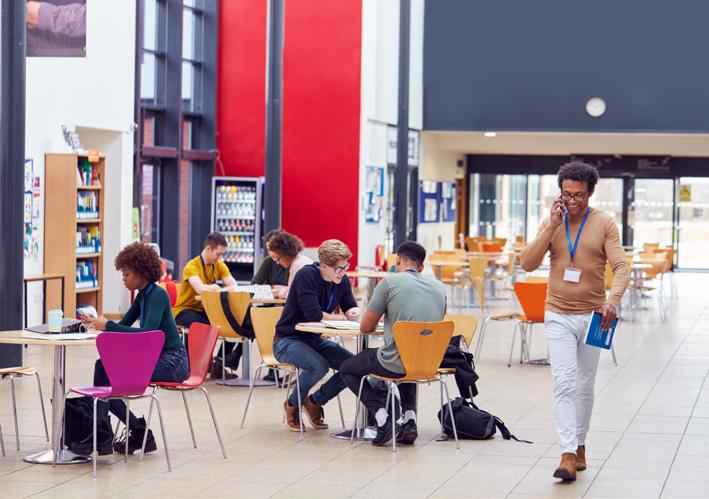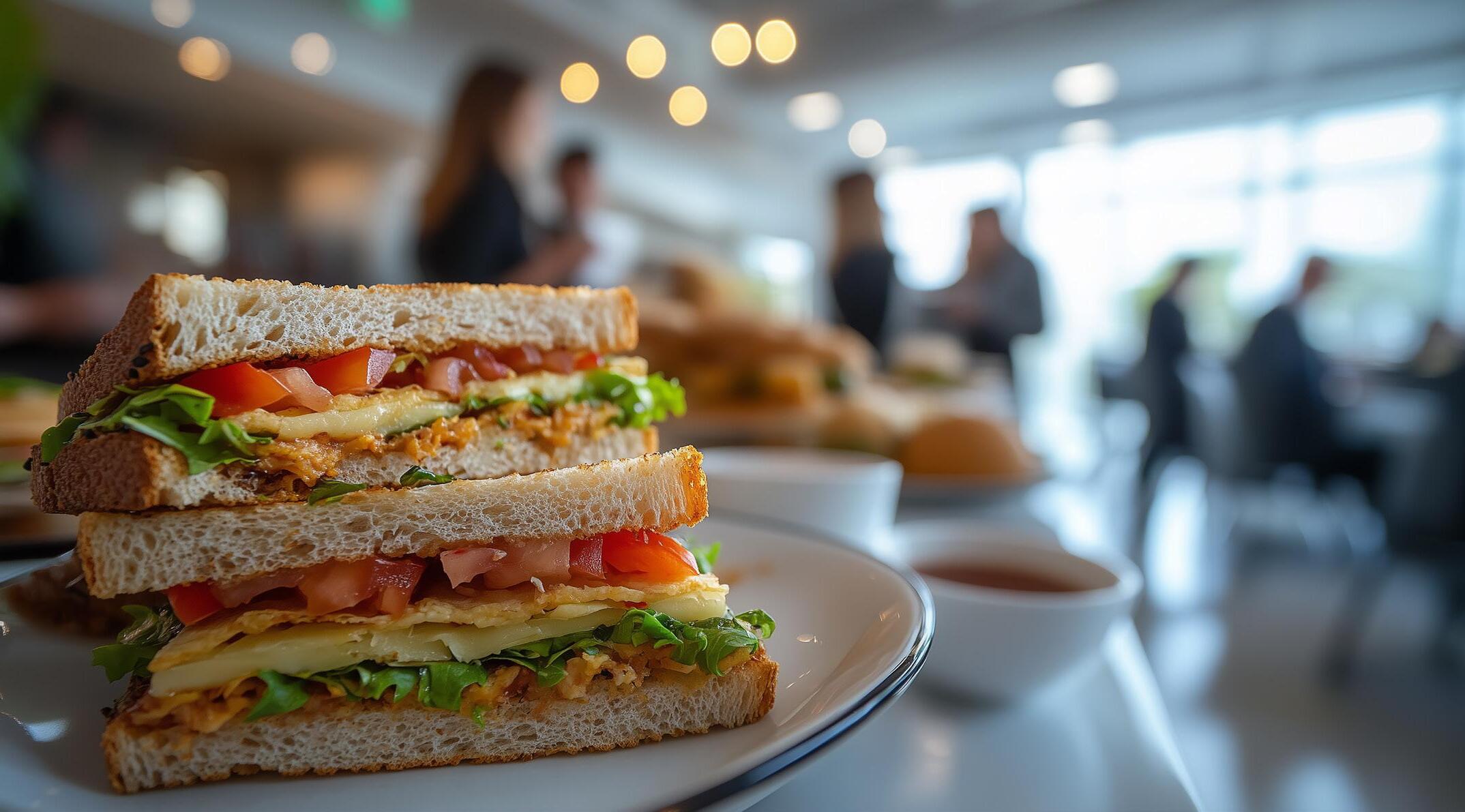
ASTLEY COMMUNITY HIGH SCHOOL SI XT H FO R M


ASTLEY COMMUNITY HIGH SCHOOL SI XT H FO R M
Dear Prospective Student,
Our Sixth Form is a very dynamic and vibrant place. In the two years that you are with us, you will not only make great progress academically in your chosen subjects but you will also have the opportunities to participate in a range of activities outside the classroom that will develop both your thinking and a broad range of life and leadership skills. When you leave our Sixth Form, our aim is that you will be fully prepared for the next step in your life.

I am sure that you will be looking for an institution which has firmly established structures for supporting students in all aspects of their studies. We guide students through the challenging transition from Key Stage 4 to Key Stage 5, by helping them develop independent study skills and therefore gain the self-confidence and personal discipline necessary to take full control of their learning. This should help them to achieve success in their courses and prepare them for university or continuous professional development in the workplace. We are proud of the fact our Sixth Form does all of these. For those students who have been with us throughout Key Stage 4, there is the additional advantage that you know the school and the school knows you and understands how to meet your needs as a learner.
Sixth Form study is a very di erent experience from the schooling you will have received so far. You will study a smaller number of subjects, and will be given more freedom and responsibility than you have ever experienced in your school life. In return, we will expect far more from you in terms of maturity and self reliance. Our outstanding Sixth Form team will do all they can to ensure that your time in our Sixth Form is a successful experience and we hope that you will help us to build upon the success that Ofsted has recognised.
Added to that we will be moving into our brand new school with all the wonderful facilities that it will provide. I am very confident that our excellent Sixth Form provision will be even better and you will be the first Sixth Form to use it.
The jump from GCSE to Level 3 study can be quite a challenge but please be assured that in our Sixth Form we shall not leave you alone to flounder. As part of a very supportive environment you will never be just a number, an anonymous individual, but will find lots of personal encouragement and help. I wish you all the best as you embark upon this new and enriching path to success.
I look forward to seeing you all in September 2025 as our new Year 12 in our new building with the wonderful facilities that it will o er you.
Yours sincerely
John Barnes

Dear Student,
Welcome to the Astley Community High School Sixth Form Prospectus. Reading through these pages will provide you with a wealth of information about our Sixth Form – the excellent range of courses we o er, the pastoral and careers support you will receive and our extensive enrichment activities.

Deciding which Sixth Form or College to attend is an important decision for you to make – it is the first step on your adult journey that may lead to university, further education/training or the world of work. I think that our Sixth Form is excellent and we are extremely successful in guiding students along the path they wish to take.
We o er a broad range of subject choices, allowing you to choose A-Level and/or BTEC qualifications. Our subjects are taught by experienced, well-qualified and skilled teachers that make lessons enjoyable, allowing for learning to take place and progress to be made. The range of subjects we o er allows for you to achieve success in whichever path you may wish to follow. This could be to progress to ‘academic’ degree courses at university such as medicine, dentistry or law or more ‘vocational’ degree courses such as nursing. Similarly, the range of subjects we o er will allow you to move on to an apprenticeship or into the world of work.
One factor that sets us apart from other Sixth Forms and Colleges is the extensive pastoral and careers support that we o er. We have a team of sta who are dedicated to ensuring that your pastoral welfare is as positive as it can be so you can focus on your learning and make as much progress as possible. Our committed Careers Lead has extensive experience and information to help you make informed choices. This goes hand in hand with our programme of university and careers speakers who come into Sixth Form and the visit opportunities to universities and workplaces that we put in place.
Fundamentally our Sixth Form is characterised by a level of respect that is shown by all members of the community. Sta and students respect one another and positive relationships flourish amongst all students. This leads to a really positive atmosphere for learning and ultimately ensures that students achieve what they are capable of.
I look forward to welcoming you to the Sixth Form in September 2025.
Yours sincerely
Richard Goodman
Dear Student,


Astley Community High School provides excellent opportunities for students wishing to continue their education. We are proud that students in our care achieve academic success and are therefore able to continue into university, apprenticeships and the world of work. It is because of this provision that every year we attract students to our Sixth Form from many other local schools.
This year is particularly exciting as we look forward to moving into our new school building. This state of the art new build will bring some incredible new opportunities to our learners, and specifically to our Sixth Form pupils. There will be dedicated Sixth Form spaces for Year 12 and 13 students to eat, relax and study. There will also be some incredible new sporting facilities that will benefit our learners and the wider community for years to come. We are taking full advantage of these opportunities, for example, the introduction of our new Sports Academy enabling our learners to benefit from class leading coaching through the Newcastle United Foundation.
For many students their decision to remain at Astley is very straight forward. One of the benefits of a smaller school like Astley is that your teachers know you very well and they know how you learn and how to support you to succeed.
There are many opportunities outside the curriculum to further develop our learners in the Sixth Form. These opportunities include work experience, university visits and preparation, and the Duke of Edinburgh Award. Students will also be able to gain sports coaching, refereeing and lifeguarding qualifications. We love to welcome students into our Sixth Form that have not studied in our Federation previously. We currently have numerous students in our Sixth Form who have joined us from other local schools across Northumberland and North Tyneside. These students thrive in our care, making new friends and developing academically as well as personally.
We look forward to welcoming you in September 2025.
Yours sincerely
Adam Ironside

• Excellent choice of academic and vocational courses, delivered by teachers who know your child and how they learn.
• Excellent outcomes in both vocational and academic subjects.
• Strong pastoral support to guide students through the transition to A Levels/BTEC and throughout their education at Astley Community High School.
• Class sizes which allow personalised ttention.

High standards and expectations of ademic performance, attendance, enthusiasm and behaviour.
et and supervised study areas in school to support your child to make the transition from GCSE to A Level.
ademic mentoring and tracking to guide students.
ogramme for our more able students to work with more able students in other schools.
• Outstanding ICT facilities to stimulate every aspect of learning.
• Excellent support from our partners including all of the local universities and a programme of visits.
• A strong career, work shadowing and higher education programme, including a careers interview programme for every student.
• Regular careers breakfast sessions where students can meet up with adults working in their chosen field.
• Enrichment programme including the Duke of Edinburgh Award to support wider learning and skill acquisition.
• A work experience placement at the end of Year 12.
• Exceptional support in making applications to university, apprenticeship providers or employers.
• Our Sixth Form Centre space exclusive to Year 12 and Year 13 o ers a modern students to eat, relax and study.

We appreciate that some students find it challenging to meet the costs of continuing to study. Financial support can help fund the costs of travel, course materials, trips and other essentials.
There are two main routes for financial help for 16-19 year olds with a potential total value of up to £1,200 per year:
• A mandatory bursary for students that do not have parental support or receive benefits in their own right;
• A discretionary bursary for students that meet criteria set by the school, such as being eligible for free school meals.
Students who travel by bus from an area that is out of our catchment, including the Blyth area, will qualify for a significant contribution towards their bus pass.
Qualifying students complete a short application form for a bursary at the start of the academic year.
In addition to your academic studies in our Sixth Form, we also provide a range of enrichment activities that enable you to play a full role in the life of the school, and the wider community. The skills that you will gain from these experiences will complement your academic qualifications and provide an excellent basis for a potential university or apprenticeship application.
New for September 2025 - Sports Academy and Sports Facilities
We are delighted to announce that from September 2025 we will be creating a Sixth Form Sports Academy in conjunction with Newcastle United Foundation.
Students who wish to join the Sports Academy will receive expert football coaching sessions from the Newcastle United Foundation coaches on our brand new floodlit 3G pitch and /or our outdoor football pitches. These sessions will form part of their weekly timetable and will involve progressive coaching sessions as well as league and cup fixtures against other schools. Members of the Sports Academy will have their own bespoke Newcastle United Foundation Training Kit.
Students who do not wish to be part of the Sports Academy can still opt for other sporting/exercise activities including swimming in our new 25m pool, fitness sessions in our new fitness suite with Technogym equipment, recreation badminton, basketball, trampolining and so much more in the sports hall and/or zumba in our state of the art dance studio.
We are a Licensed Centre for the Duke of Edinburgh Award and have the exciting opportunity to o er the Silver Award to Sixth Form students. You will enjoy loads of new experiences, discover talents you never thought you had, challenge yourself and work hard as part of a team. There are also many other benefits.
• Achieving a D of E Award will give you skills, confidence and a view on life that everyone is looking for, from employers to colleges and universities.
• Being recognised for doing things you want to do and may even be doing already.
• Making a di erence to other people’s lives and your community, being fitter and healthier, making new friends and having memories to last you a lifetime.
The D of E Award comprises four areas which will vary in length depending on whether you are aiming for the Bronze or Silver Award.
• Volunteering - helping others in some way.
• Physical - improving personal fitness.
• Skills - learning or developing a personal skill.
• Expedition - a remotely supervised expedition, where you will carry all your personal kit and camp overnight (one night for Bronze, two night for Silver)
We o er the NPLQ which is recognised world wide, opening up great opportunities in the form of employment and life skills. Lifeguarding is an excellent starting point for those interested in a career in the leisure industry. Once qualified, candidates can also apply for a position as a casual lifeguard at Astley Community High School.


Our Sixth Form has an academic ethos, with our main priority being that students excel in their studies.

school. Students are given new freedoms and privileges. For students can sign out of school during ‘free’ periods, or the time working or socialising in the new Sixth Form Centre.


and Year 13 students to eat, relax and study.
Eat
Cafe 6 o ers an exclusive service for Sixth Form students to dine in the Sixth Form Centre.
Relax
Students can relax in the sofa area and use The Book Exchange or re-focus their minds with a game of pool.
We provide attractive and well-resourced study spaces in the main school building for students to use when they are timetabled for independent study. As an alternative to the library during free periods, the centre has additional study space for students to use with free wi-fi and electric sockets for laptops and mobile devices.


an choose to study at Astley tudents pick a purely ay and choose to study t students in Year 12 will els, and then focus on Levels tend to be exams at the end of Year t the end of Year 13.
Other students are keen to take a more vocational route and therefore study Level 3 BTEC or Cambridge Technical Qualifications. These are equivalent to A Levels but tend to be assessed through both coursework and examination. These courses all run for two years. Some students enjoy studying a mix of both vocational Level 3 courses and A Levels.
It is a national requirement that all students must re-sit their English and/or Maths GCSE if they do not achieve at least a grade 4 in Year 11.
This course allows students who would like to take one Art option the chance to work across two or more media areas, such as Textiles and Fine Art, or Graphics and 3D Design.
The work builds on the subjects studied at GCSE. At this stage there is more time and opportunity to explore a greater variety of artistic media and students are encouraged to develop their own ideas and style of working.
There is a written element to the course, beginning with research assignments and homework which will help you to relate your own art work to that of other artists, and culminating in a personal study of an artist or an aspect of Art at A Level. There is a strong emphasis on developing your own ideas.
Specific Art Options
3D Design, Textiles, Fashion, Graphic Design, Fine Art and Photography. Students interested in following a specialist course in one of the above areas will be able to select the specific units for their chosen specialism and all final pieces should reflect this choice. The decision to follow a specialist course must be made during the options process for examination entries.
Students who are interested in studying more than one A Level in Art and Design can do this by choosing two specific art options. One A Level will be undertaken in Year 12 and the second A Level will be undertaken in Year 13. Students will be timetabled into both Year 12 and Year 13 classes in order to receive an appropriate amount of tuition.
Double Award student will need to have skills at A Level Standard from the outset. We expect that students will have achieved at least Grade 7 at GCSE in Art or 3D Design if they wish to be considered for this.
5 GCSE’s at grade 9 - 4 including Art or 3D Design at Grade 6 or higher. Although students who have not studied Art or 3D Design at GCSE can still gain a place on the course via portfolio submission.
For each A Level you are studying you will need to complete each unit below.
Unit 1: Personal Investigation
Candidates develop work in response to an idea, issue, concept or theme of their
choosing. Candidates are required to develop a personal investigation based on an idea, issue, concept or theme supported by 1000 – 3000 words.
Unit 2: Externally-Set Assignment
Eight exciting starting points are given by the examboard. Candidates choose one and produce a body of work based upon this theme.
Candidates must complete 15 hours of unaided, supervised time at the end of this project, the first 5 hours will be consecutive.
Coursework based assessment.
Higher education: Foundation course or degree course in art and design.
Careers: Directly relevant career choices include Graphic Design, Product Design, Fashion, Photography, Marketing and Advertising. However, A Level Art encourages an aesthetic sensibility which enhances life on a personal level and is also useful for careers in Teaching, Nursing, Occupational Therapy or any job where a creative approach is required.
The course builds on the biological concepts and principles studied at GCSE. The curriculum develops your practical and analytical skills as well as the ability to apply biological principles to complex situations. It also promotes an awareness of social, environmental and economic issues relating to topics such as genetic engineering.
5 GCSEs at grade 9-4, including English, Maths and Biology to grade 6 or Combined Science to 6-6.
Four units of study which encompass the following topics: practical skills; cell structure; biological molecules; cell division; cellular organisation; exchange surfaces; transport in animals and plants; microbes and immunity; classification; evolution and biodiversity.
Will comprise the four units of study which form the AS plus two additional units. The two additional units will include the following topics: homeostasis; excretion; plant and animal responses; photosynthesis; respiration; genetics; cloning; genetic engineering and ecosystems.
Students usually go on educational visits to enrich their biological knowledge. Such visits have included: the electron microscopy suite at the Medical School; an ecological survey at Whitley Bay; genetic engineering at the Centre for Life; Edinburgh Zoo; and a residential field trip.
Final grade based on performance in terminal exam assessments. For A-level (only) they will also be awarded a separate certificate for their practical competence in the subject.
Higher education: Biomedical Sciences, Forensic Science, Nursing, Midwifery, Sports Science, Medicine, Veterinary Medicine, Marine Biology.
Careers: Doctor, Nurse, Midwife, Research Scientist, Forensic Scientist, Drug Analyst, Ecologist in institutions such as hospitals, universities, the government and research organisations.
This programme of study will give you an exciting insight into the contemporary world of Chemistry focusing on the structure and properties of matter, including the energy changes that accompany chemical reactions.
You will learn about Chemistry in a range has on industry and many aspects of everyday life. You will learn to investigate and solve problems, discovering the role that Chemists play in our everyday lives developing new technologies and material for uses in medicines, mobile devices, agriculture and new materials.
5 GCSEs at grade 9-4, including Maths and Chemistry to grade 6 or Combined Science to grade 6-6.
This underpins the whole of the A Level specification and covers the practical skills that students develop throughout both AS and the full A Level course.
Unit 2: Fundamentals in Chemistry
Unit 3: Periodic Table and Energy
Unit 4: Core Organic Chemistry
Will comprise the four units of study which form the AS plus two additional units:
Unit 5: Physical Chemistry and Transition Elements
Unit 6: Organic Chemistry and Analysis
Final grade based on performance in terminal exam assessments. For A-level (only) they will also be awarded a separate certificate for their practical competence in the subject.
Higher education: Healthcare such as Medicine, Pharmacy and Dentistry as well as the Biological Sciences, Physics, Mathematics, Pharmacology Analytical Chemistry, Biochemistry.
Careers: Wide range of careers in the Chemical, Manufacturing and Pharmaceutical industries and in areas such as Forensics, Environmental Protection and Healthcare. The problem solving skills developed are also useful for many other areas, such as Accountancy and Law.
Studying English Language A level is very di erent from GCSE. English Language o ers the opportunity to develop your knowledge, understanding and appreciation of language in use and to consider some critical language debates. This A Level o ers you a broad insight into the way we use the English language to communicate. You also explore the role language has within society and how we use, adapt and change the language we use for di erent purposes.
Throughout the course you will develop a range of skills which will prepare you for life beyond sixth form. You will work on your analytical skills, presentation skills, research skills and more.
5 GCSEs at grade 9-5, including a grade 6 in English Language and/or Literature.
The key topic areas explored include:
• How meanings and representations are constructed in language
• Language Variation: regional and global forms of English
• Child Language Acquisition (0 - 11 Years)
• The history of the English Language
• Exploring how aspects of our identity (gender, age, occupation etc.) are reflected in the language we use
• The key characteristics of di erent ‘forms’ of English (e.g. journalistic writing)
• Independent Language Investigation (e.g. social variation, global variation, language and power)
• Learning how to write for an audience and purpose
This course will be assessed by a combination of written examination papers and coursework. Students will be expected to complete their own original writing as well as undertaking a language investigation on an area of their own personal interest.
AS Level
Exam based assessment
A Level
Exam based assessment and coursework.
Higher Education: English Language can be studied as a single subject in higher education or can be combined with English Literature or a wide range of other subjects. Specific degrees in Linguistics can also be combined with the study of a Foreign language.
Careers: The study of English Language provides a range of skills which support a range of careers including: publishing, teaching, journalism, marketing, law, copywriting, research, speech and language therapy.
The focus is on the genres of tragedy and crime. Within these genres you will study a Shakespeare play, novels, drama texts and a selection of poetry.
In your second year of study you will complete an independent study and study theories of Literature. This will lead to two pieces of coursework. You will also be expected to be able to link texts at A Level rather than study them separately. The genre chosen in Year 12 continues through Year 13.
5 GCSEs at grade 9-5, including a grade 6 in English Language and/or Literature.
Paper 1: Literary genres: aspects of tragedy
Study of three texts: one Shakespeare text; a second drama text and one further text, of which one must be written pre-1900.
Paper 2: Texts and genres : elements of crime writing
Study of three texts: one post-2000 prose text; one poetry and one further text, one of which must be written pre-1900. Examination will include an unseen passage.
Theory and independence (coursework)
Study of two full texts: one poetry and one prose text, informed by study of the Critical Anthology.
Two essays of 1250–1500 words, each Anthology.
Exam based assessment and coursework.
Higher education: This A Level is an excellent basis for further study in the area of English. Specific degrees in subjects such as Comparative Literature are available.
Careers: Study of English Literature develops skills that support a wide range of careers including Teaching, Journalism and Law.
A Level French introduces us to modern France. It explores technological and social change, looks at diversity, current trends and the benefits or problems they may bring.
It studies the highlights of francophone artistic culture, including music, cinema and literature, and addresses young people’s political engagement and current issues in the French-speaking world.
It will also explore the influence of the past on present-day French speaking communities.
You will study a contemporary book and a film and have the opportunity to carry out independent research on a project of your choice.
GCSE French grade 6 is essential.
A Level
Social issues and trends
Political and artistic culture
Grammar
Literary texts and films
Individual research project
Paper 1: Listening, reading and writing (2 ½ hour exam).
Paper 2: Writing (2 hours).
Paper 3: Speaking (approximately 20 minutes).
French is highly valued by universities; it is one of the facilitating subjects. French is an asset to any future career and options are wide and varied including Translation, Teaching and Journalism.
A Level Geography covers both the physical and human environments and the complex interaction of processes that shape our world. It will also show the applied side of the subject - how human of processes on their environment. This is complex and dynamic and varies from place to place depending on people’s resources, technology and culture. There is plenty of room for discussion and extended research which will help you become an independent thinker and learner.
Fieldwork will be an essential part of your A Level course.
5 GCSEs at grade 9-4, including English and Maths. GCSE Geography grade 6 is essential.
Component 1: Physical Geography
• Water and carbon cycles.
• Coastal systems and landscapes.
• Hazards.
Component 2: Human Geography
• Global systems and global governance.
• Changing places.
• Contemporary urban environments.
Component 3: Geographical investigation
Students will complete an individual fieldwork investigation relating to the A Level course. The work will be marked by your teachers and moderated by the examboard.
Exam based assessment and coursework.
Geography is highly valued by universities; it is one of the facilitating subjects. Higher education routes are wide and varied from Surveyor, Retail Manager, Teacher, Coastal Engineer, Weather Forecaster to Urban Planner.
Put simply, History is the study of the past. It is a vitally important subject in the modern world as it is inescapable; we study the past from our present perspective, so connecting us to the past and showing us who and why we are.
It allows us to understand the world in which we live, our personal history, by appreciating the events on a national and international stage that have shaped it. Understanding this is not simply useful, it is crucial.
Furthermore, through the academic rigour of the subject, students who choose History develop key skills for their future lives, such as communication, presentation, analytical thinking, and decision-making.
5 GCSEs at grade 9-4, including English and Maths. GCSE History (grade 5 or above) is preferable but not essential.
Lancastrians, Yorkists and Henry VII: including Wars of the Roses 1445–1461, Edward IV’s first rule and the crisis of 1470–1471, Edward IV and Richard III 1471–1485, Henry VII’s rule in England 1485–1509, Henry VII’s foreign policy 1485–1509.
Unit 2: Democracy and Dictatorships in Germany 1919–1963
This includes the establishment and development of the Weimar Republic 1919–1933, the establishment of the Nazi Dictatorship and its domestic policies 1933–1939, the impact of World War Two and defeat on Germany 1939–1949, and a divided Germany, the Federal Republic and the GDR 1949–1963.
Unit 3: Russia and its Rulers 1855–1964
The nature of government in Russia includes autocracy, the impact of dictatorial regimes on the economy and society of the Russian Empire and the USSR, the impact of war and revolution on the development of the Russian Empire and the USSR, the Empire, nationalities and satellite states. There are also depth studies on Alexander II’s domestic reforms, the Provisional Government, and Khrushchev in power 1956–1964.
This unit is a non-exam, independently researched essay of 3000–4000 words in length. The work will be marked by teachers. Students will carry out an independent investigation of a historical issue of their personal choice.
Exam based assessment and some internal assessment with external verification.
Higher Education: Ancient History, Medieval History, Early Modern History, Modern History, Archaeology, Law, Teaching. History is generally highly valued by universities; it is seen as a facilitating subject for the study of a wide range of subjects.
Careers: Historian, Teacher, Journalist, Librarian, Lawyer, Solicitor.
Studying Law gives students an understanding of the role of Law in today’s society and raises their awareness of the rights and responsibilities of individuals.
By learning about legal rules and how and why they apply to real life, students also develop their analytical ability, decision making, critical thinking and problemsolving skills. All these skills are highly and employers.
Topics are clearly structured and include:
• Private law
• Public law
• Legal skills
At least 5 good GCSEs (grades 9-4) including English at grade 5.
1. Criminal Law - including: rules and theory of criminal law, fatal and non-fatal
2. Tort Law - including: rules and theory of tort law, negligence, nuisance and defences.
3. The nature of law and the English legal system - including: law and society, law and justice, law and morality, judicial precedent.
4. Human Rights - including: rules and theory in human rights, European Convention on Human Rights and International Law.


Exam based assessments.
Higher education: A Level Law is an excellent basis for further study in a range of degree subjects including: Law, Journalism, English, Media as well as providing a foundation for a degree apprenticeship in Law.
Careers: Solicitor, Barrister, Legal Executive, Advocate, Journalist, Court Clerk, any other legal based professions.
If you have a real interest in Mathematics, enjoy the challenge of solving problems and can communicate in a logical, be the course for you.
The content is split between Pure and Applied Mathematics. In Pure Maths, you will develop the algebraic and trigonometric skills you gained from GCSE. You will apply these new Mathematical concepts and methods in your Statistics and Mechanics units.
5 GCSEs at grade 9-4 including English and Maths. You must achieve the equivalent of grade 7 or above in GCSE Mathematics.
Pure Mathematics
• Develop your understanding of algebra, functions, trigonometry, sequences and vectors.
• Discover calculus, exponentials and logarithms.
• Understand the concept of proof.
Statistics
• Use a range of measures and distributions to analyse and model data.
• Test hypotheses to identify stability or change.
• Deepen your understanding of probability using Venn diagrams.
Mechanics
• Discover Newton’s Laws of Motion and use them to model real life scenarios.
• Consider the forces acting on an object.
• Apply your knowledge of calculus and vectors to real problems.
Pure Mathematics
Extend your study of AS Level content, including:
• Developing methods in calculus for functions not in polynomial form.
• Exploring new types of sequences and series.
Statistics
• Consider more sophisticated statistical modelling to enhance AS Level skills.
• Develop an understanding of conditional probability.
Mechanics
• Extend your kinematics knowledge to include projectiles.
• Consider how inclined planes and friction impact motion.
• Use moments to solve problems involving equilibrium.
Exam based assessment in Year 13. Two pure papers and one applied paper.
Higher Education: Mathematics, Statistics, Accountancy, Engineering, Computer Science, Education, Economics, Medicine, Dentistry.
Careers: Statistician, Accountant, Systems Analyst or Programmer, Economist, Teacher, Doctor, Dentist. Many of the ideas in Statistics have applications in a wide range of other fields, from assessing car insurance costs to evaluating risk due to natural disasters. Many techniques are used widely in Sciences and Social Science.
Physics is fundamental to our understanding of how the universe works. By choosing to take an A Level in Physics, you choose to study an enormously stimulating subject that also sits right at the heart of technology development.
Physics today is a very rewarding and exciting field with new discoveries occurring at the frontiers of human knowledge. Its methods and insights are widely applicable and its practitioners highly sought.
5 GCSEs at grade 9-4, including Maths and Physics to grade 6 or Combined Science to grade 6-6.
AS Level
Unit 1: Measurements and their errors
Unit 2: Particles and radiation
Unit 3: Waves
Unit 4: Mechanics and materials
Unit 5: Electricity
A Level
Will comprise of the five units of study which form the AS plus four additional units:
Unit 6: Further mechanics and thermal physics
Unit 7: Fields and their consequences
Unit 8: Nuclear physics
Unit 9: Astrophysics
Final grade based on performance in terminal exam assessments. For A-level (only) they will also be awarded a separate certificate for their practical competence in the subject.
Higher Education: Physics, Engineering and other Science-related courses.
Careers: While many students go on to careers that use their knowledge and expertise in Physics, others are readily employed in other areas such as Computing or Electronics. Skills gained through studying Physics, such as problem solving and numeracy, lend themselves to a range of careers including Engineering, Management, Accountancy, Law, Broadcasting and Computing /IT.
Psychology is the scientific study of human behaviour. You will look at di erent explanations for the way in which humans (and non-humans) behave.
You will also spend time analysing evidence and theories and comparing research in order to be able to reach conclusions about a variety of topics including schizophrenia, addiction and cognition and development.
You will look at how ideas and theories in each area of Psychology have developed, learn how to critically analyse evidence and undertake some practical research.
During your studies, you will have the chance to visit local university psychology faculties, and outside speakers will also visit the school to o er particular insight into di erent areas of the subject.
5 GCSEs at grades 9-4, including English and Maths.
AS Level
Paper 1:
Social Influence
Memory
Attachment
Paper 2:
Psychopathology
Approaches
Biopsychology
Research Methods
A Level
Paper 1:
Social Influence
Memory
Attachment
Psychopathology
Paper 2:
Approaches
Biopsychology
Research Methods
Paper 3:
Issues and Debates
Cognition and Development
Schizophrenia
Addiction
AS Level: 2 Examinations, each 1.5 hours long
A Level: 3 Examinations, each 2 hours long
Higher Education: Educational Psychology, Clinical Psychology, Occupational Psychology, Business Management, Psychiatry and Teaching
Careers: Police, Nursing, Business Management, Human Resources, Hospitality, Counselling, Social Work, the Prison Service and Criminology.
Sociology is a contemporary subject, which is very much connected to the present.
It explains the way in which society works and how individuals live together and cooperate through social institutions such as the education system, the media, the healthcare system and the criminal justice system.
Sociology examines the development of society and the theories of those who have observed it, such as Karl Marx and Emile Durkheim.
Studying Sociology allows you to examine current a airs, how society works and the people within it.
5 GCSEs at grades 9-4, including English and Maths.
AS Level
Paper 1: Education Methods in Context
Paper 2: Health Research Methods Theory and Methods
A Level Paper 1: Education Methods in Context Theory and Methods
Paper 2: Health Media
Paper 3: Crime and Deviance Theory and Methods
AS Level: 2 Examinations, each 1.5 hours long
A Level: 3 Examinations, each 2 hours long
Higher Education: Sociology, Social Work, Social Policy, Criminology.
Careers: Social Work, Counselling, Law Enforcement, Healthcare, Teaching, Journalism, Social Policy O icer, Government/Politics.
The BTEC Level 3 National Extended Certificate in Applied Science is intended as an Applied General qualification for post16 learners who want to continue their education through applied learning and who aim to progress to higher education and ultimately to employment, possibly in the applied science sector.
The qualification is equivalent in size to one A Level and aims to give a coherent introduction to study of the applied science sector.
Minimum of 5 GCSEs at grade 9-4, including English, Maths, and Combined Science (or Biology, Chemistry, Physics) to grade 5/5-5.
ENTRY REQUIREMENTS
Learners will study three mandatory units.
Unit 1: Principles and applications of science
Unit 2: Practical scientific procedures and techniques
Unit 3: Science investigation skills
Learners choose one optional unit which has been designed to support choices in progression to applied science courses in higher education. These can include:
Unit 8: Physiology of human body systems
Unit 14: Applications of organic chemistry
Unit 15: Electrical circuits and their application
The assessment for this BTEC is a mix of both internally assessed work and externally assessed assessments.
Unit 1 and 3 are externally assessed while Unit 2 and the optional unit are internally assessed.
The requirements of the qualification help learners develop the transferable and higher order skills which are valued by higher education providers and employers. For example, when studying Unit 3: Science Investigation Skills, learners will develop skills including how to plan investigations, collecting, analysing, and presenting data and communicating results, all of which are the skills learners need to progress to higher education, employment, self-employment or training.
The qualification carries UCAS points and is recognised by higher education providers as contributing to admission requirements for many courses if taken alongside other qualifications as part of a two-year programme of learning, including, but not exclusively, those which are sciencerelated such as Nursing, Physiotherapy, Laboratory Technician, Food Technology or Engineering.
This course has been designed to provide you with a detailed knowledge and understanding of the main aims and objectives of any business. You will learn the roles and responsibilities of people in business and study how to be successful in many aspects of business planning.
Visits to local businesses will be arranged. In the past, students have visited local businesses such as Greggs, Sainsbury’s and Hilton Hotel as well as Alton Towers and Disneyland Paris.
At least grade 9-4 in GCSE English and Maths. No prior knowledge of Business is required but if previously studied at least a Level 2 pass in BTEC is required.
Level 3 Cambridge Technical Extended Certificate in Business.
Unit 1: The Business Environment (Exam)
Unit 2: Working in Business (Exam)
Unit 4: Customers & Communication (Coursework)
Unit 5: Marketing & Market Research (Coursework)
Unit 8: Introduction to Human Resources (Coursework)
Examinations will be set and assessed externally by the examination board, coursework units will be assessed internally by your teacher and moderated by the examination board.
Higher Education: This course will allow you to progress to higher education, go directly into the workplace or take up a higher level apprenticeship in the varied aspects of the business world.
Careers: Financial Management, Human Resources, Marketing /Advertising, Website Design, Operations Management and lots more!
Learners will develop an understanding of how di erent media institutions operate to create products that appeal to specific target audiences. They’ll gain knowledge and understanding of the pre-production, planning and production processes and go on to create a media product.
Throughout the course learners will also develop transferable skills such as planning, communication, adaptability and leadership. The optional units provide learners with the opportunity to broaden their knowledge, understanding and skills in key areas such as, Social media and globalisation and sound production.
There are no formal entry requirements for this qualification. It is recommended that learners have a grade 4 or above in English Language and Maths GCSE.
Level 3 Cambridge Technical Extended Certificate in Digital Media.
Unit 1: Media products and audiences (Mandatory External)
Unit 2: Pre-production and planning (Mandatory External)
Unit 3: Create a media product (Mandatory Internal)
Unit 6: Social media and globalisation (External)
Unit 16: The creation and use of sound in media (Internal)
Units 1, 2 and 6 are assessed by examination and marked by the exam board. Astley sta will internally units 3 and 16 and the exam board will moderate them.
This qualification is suitable for learners who want to gain a Level 3 qualification to support further study at University in Digital Media Production, Film or Audio and Visual Media or who want to progress into a media-related apprenticeship.
.
This course will provide learners with the opportunity to develop a breadth and depth of knowledge, skills and understanding required by the Health and Social Care sector.
The course includes 360 Guided Learning Hours (GLH) which is equivalent to one A Level in terms of size.
Mandatory units
Four mandatory units and two optional units.
Three externally examined units and the remaining units will be centre assessed and moderated by OCR.
5 GCSEs at Grades 9-4, including English, Maths and Health and Social Care.
Level 3 Cambridge Technical Extended Certificate in Health and Social Care.
Lorem ipsum
Unit 1: Building positive relationships in health and social care
Unit 2: Equality, diversity and rights in health and social care
Unit 3: Health, safety and security in health and social care
Unit 4: Anatomy and physiology for health and social care
Unit 10: Nutrition for health
Unit 13: Sexual health, reproduction and early development stages
There will be three external exams for units 2, 3 and 4. The remaining units will be assessed by coursework.
Higher Education: Midwifery, Nursing, Paramedic Science, Mental Health Nursing, Radiography, Health Care Management, Physiotherapy, Psychology, Social Care and Teaching.
This course encompasses drama, dance, music and any genre that involves performing in front of an audience. Performing arts is a growth industry and this course gives students opportunities to research and gain insights into the
prepare for employment, further training and/or study.
Students have the opportunity to develop specialist knowledge, understanding and skills in either performance (dance, drama or music) or production (Choreography, set design, costume design, directing, stage management, lighting and sound). Students choose one discipline, within either performance or production.
This course is a Level 3 Certificate which will be studied over 2 years. The units involve students developing their performing skills and applying them to practical contexts. Students will also plan and realise a Performing Arts event.
A background in performing arts is preferable but not essential. The course builds on knowledge, understanding and skills developed in any GCSE creative and expressive arts subject, for example Drama, Music or Performing Arts.
The course has 2 units:
This unit gives students the opportunity to develop one discipline within performing arts (from either Performance or Production) and then apply this discipline in a performance context. To develop the discipline, students work individually and in groups. They explore two contrasting extracts of repertoire from a range of existing material including musical scores, set works and published extracts.
Students interpret a stimulus to create a performing arts event that will draw on existing material. An external examiner will examine each student in their chosen discipline, which reflects the development of their skills from Unit 1.


Unit 1: A portfolio of research and development of skills alongside live performance/production.
Unit 2: Live performance and/or presentation.
Higher education: creative arts degrees in Music, Music Technology, Music Promotion, Dance, Drama, Performings Arts, Performance Art, Theatre Studies, Stage,Set and Costume Design, Musical Theatre, Media studies, Film and TV production, Technical Media Production.
Careers: Actor, Community Arts Worker, Choreographer, Dancer, Drama Therapist, Music Producer, Music Therapist, Theatre Director, Musician, Composer.
Jobs where your skills would be useful include: Arts Administrator, Broadcast Presenter, Film Director, Further Education Teacher, Higher Education Lecturer, Primary/Secondary School Teacher, Special E ects Technician, Talent Agent, Theatre Stage Manager.
This qualification is for learners 16 years old or over who want to study sport, leisure or fitness.
This qualification is not just about being able to play sport. It will provide learners with the skills, knowledge and understanding to progress into Higher Education on a sport related programme such as Sport and Physical Education.
Learners can choose from 3 di erent qualifications:
• An Extended Certificate (equivalent to 1 A Level),
• A Diploma (equivalent to 2 A Levels) or
• An Extended Diploma (equivalent to 3 A Levels)
The Extended Certificate is an Applied General qualification and takes 360 guided learning hours to deliver which means it is equivalent to one A level. Taking the Extended Certificate alongside other vocational or academic qualifications would allow learners to study sport and physical activity, or another related sector, in higher education or further study.
5 GCSE’s at grade 9 - 4, including English, Maths and GCSE PE/BTEC Sport or equivalent.
The Units that the learners will study will depend upon the size of the qualification that they choose to follow. These will be a mixture of external examinations and internally assessed coursework. Some of the units that all learners will follow are listed below:
Unit 1: Body system and the e ects of physical activity (exam)
Unit 2: Sports coaching and activity leadership (coursework)
Unit 3: Sports organisation and development (exam)
Unit 17: Sports injuries and rehabilitation (coursework)
Unit 19: Sports psychology (coursework)
This will be via external exams and internally assessed coursework. The number of external exams will depend upon the size of the qualification the learner chooses to follow.
Higher Education: Sports and Exercise Development, Physical Education with Qualified Teacher Status, Sports Coaching, Exercise Physiology and Physiotherapy.
Career: Sports Coaching, Fitness Training, Instruction, PE Teaching, Police and Fire Service and other uniformed services.
This course has been designed to provide you with a detailed knowledge and understanding of one of the world’s fastest growing industries. It is an ideal qualification if you want a broad background into the travel and tourism industry.
Visits to travel destinations will be arranged. In the past, students have visited both local attractions and places further away such as Alton Towers, Disneyland Paris and New York.
At least grade 9-4 in GCSE English and Maths. No prior knowledge of Travel and Tourism is required but if previously studied, at least a Level 2 pass in BTEC Travel and Tourism is required.
Level 3 BTEC National Extended Certificate in Travel and Tourism.
Unit 1: The World of Travel and Tourism (Exam)
Unit 2: Global Destinations (Exam)
Unit 3: Principles of Marketing in Travel and Tourism (Coursework)
Unit 4: Visitor Attractions (Coursework)
Examinations will be set and assessed externally by the examination board, coursework units will be assessed internally by your teacher and moderated by the examination board.
Higher Education: This course will allow you to progress to higher education, go directly into the workplace or take up a higher level apprenticeship in the varied aspects of the travel and tourism industry.
Careers: Tourist Information, Tourist Guide, Customer Service Advisor, Resort Representative, Tour Operations, Telephone Sales, Hotel Manager, Activities Coordinator, Airlines and Airport Work and lots more!
It is a national requirement that the resit course for GCSE Maths and GCSE English Language is a compulsory part of your post-16 study time if you do not achieve at least a grade 4 in one or both of these subjects at the end of Year 11.
Students will be required to continue studying English Language and/or Maths GCSE if they have not achieved at least a grade 4 in Year 11.
You will recap and extend your skills in five key areas:
Number: Work with integers, fractions, decimals and percentages.
Ratio and Proportion: Calculate with ratio and use it to solve proportion problems in real life context. Combine the use of ratio with fractions, percentages and algebra.
Algebra: Use formulae accurately in a real life context. Solve equations and inequalities. Understand how sequences work and how to find the nth term. Draw and interpret graphs.
Shape: Calculate areas and volumes. Use Pythagoras’ theorem to find a missing length on a right angled triangle. Discover angle facts and construct loci.
Data: Compare data sets using average and spread. Display data using a range of diagrams. Explore the concept of chance and probability.
You will recap and develop your skills in the following areas:
Reading fiction and non-fiction: Identifying and interpreting information; analysing language and structuring; evaluating a text and comparing pre-1900 and modern texts.
Creative and non-fiction writing: Writing to describe or narrate and writing to explain a point of view.
Maths
One non calculator and two calculator examinations.
English
A spoken language assessment and two written exams.
Most university courses and many apprenticeships require applicants to have the equivalent of grade 4 in GCSE Mathematics and for English.